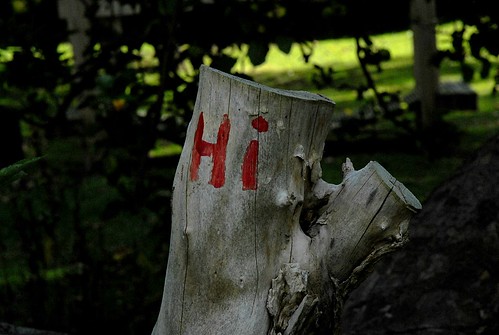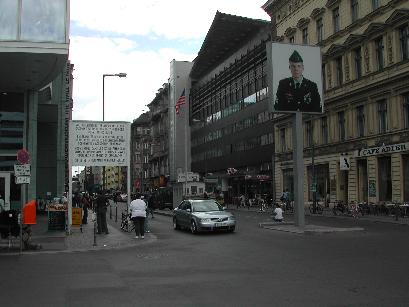Seen in our village playground.
Category Archives: Asides
How to get people up in the morning
My friend Jonathan Steinberg has written a wonderful biography of Bismarck, which I’m reading in the Kindle edition
and thoroughly enjoying. This passage about Bismarck’s time as a country squire and his behaviour as a host (or even an host) made me laugh out loud:
One night after a long journey, Herr von der Marwitz and a friend showed up unannounced at Kniephof [Bismarck’s estate]. Bismarck welcomed them, set out the usual fare, and the visitors and their host sat late and drank a lot.
He apologised in advance that he would not be able to see them at breakfast because he had to be in Naugard by 7am. The guests needed to go there too and, though Bismarck strongly urged them to sleep as late as they liked, they eventually agreed that Bismarck would wake them at 6.30 in the morning. They drank on and eventually went to bed. The friend said to von Marwitz, as they climbed the stairs to the guest room, ‘I have had more drink than I am used to and I want to sleep it off tomorrow morning’. ‘You can’t do that’, Herr von Marwitz said. ‘Wait and see,’ replied the friend who pushed a huge chest of drawers against the door.
According to von Marwitz’s account,
“At 6.30 in the morning, Bismarck knocked at the door. ‘Are you ready?’ No sound from the room. Bismarck turned the doorknob and pushed the door against the heavy chest. A few minutes later he called out from the courtyard. ‘Are you ready?’ No sound from us. Two pistol shots crashed through the window-glass and knocked plaster onto my friend, who crept to the window and stuck a white handkerchief out on the end of a stick. In a few minutes we were downstairs. Bismarck greeted us with his usual heartiness without a word about his little victory.”
Hmmm… This might work with teenagers. I’ll need a gun licence, though.
Time Warner: profiting from hacktivism?
Aw, isn’t this lovely? When members of the hacktivism group Anonymous appear in public to protest against censorship and corruption, they wear plastic masks of Guy Fawkes, the celebrated 17th-century terrorist. But guess what?
Stark white, with blushed pink cheeks, a wide grin and a thin black mustache and goatee, the mask resonates with the hackers because it was worn by a rogue anarchist challenging an authoritarian government in “V for Vendetta,” the movie produced in 2006 by Warner Brothers.
What few people seem to know, though, is that Time Warner, one of the largest media companies in the world and parent of Warner Brothers, owns the rights to the image and is paid a licensing fee with the sale of each mask.
Groucho Marx, where are you when we need you?
Introducing Professor Pleasure-Sloper
There’s a lovely review by Jacob Heilbrunn of Adam Sisman’s Hugh Trevor-Roper: The Biography in The National Interest.
Of the best-seller that launched Trevor-Roper on the public stage — The Last Days of Hitler — Heilbrunn writes:
It was a piece of sleuthing that had been assigned to him by the secret services. Trevor-Roper’s friend Dick White, a brigadier commanding the counterintelligence bureau (later the head of MI5 and MI6), hit upon the idea of the inquiry and encouraged Trevor-Roper to carry it out beginning in September 1945. The idea was to dispel Stalin’s propaganda efforts to suggest that Hitler had escaped and was in hiding (in fact, the Russians had dug up his body in May 1945, and legend has it that Stalin used Hitler’s skull as an ashtray). Trevor-Roper displayed real initiative: it was a onetime opportunity to make history himself. He interviewed numerous Nazi bigwigs and tracked down Hitler’s last will and testament. He formed the fullest picture of Hitler’s final days, demonstrating beyond doubt that the Nazi leader had expired by his own hand in April 1945 and that his and Eva Braun’s corpses were doused with gasoline by his lackeys and set on fire. The skill with which Trevor-Roper fashioned his intelligence report bears comparison with the greatest historians:
“In the absolutism, the opulence, and the degeneracy of the middle Roman Empire we can perhaps find the best parallel to the high noonday of the Nazi Reich. There, in the severe pages of Gibbon, we read of characters apparently wielding gigantic authority who, on closer examination, are found to be the pliant creatures of concubines and catamites, of eunuchs and freedmen; and here too we see the élite of the Thousand-Year Reich a set of flatulent clowns swayed by purely random influences.”
Trevor-Roper’s most basic insight was that, for all its pretensions to totalitarian control, the Nazi system was, in essence, an inefficient and chaotic court system that consisted of rival paladins each seeking Hitler’s blessing.
It is surely significant, however, that Trevor-Roper had not alighted upon the topic of his own accord. The criticism for the rest of his life would be that he never produced anything that matched it. Perhaps Trevor-Roper stumbled into his work as a historian more than he, or anyone else, really cared to admit. What’s more, the Nazi era turned into a lucrative gig for Trevor-Roper; as Sisman underscores, he was repeatedly called upon over the decades to attest to the reliability and provenance of Nazi documents, a task he was prepared to undertake as long as it was accompanied by an imposing fee. The Last Days alone paid for his Bentley.
I’ve always been morbidly fascinated by Trevor-Roper, particularly by his mordant wit and elegantly mannered literary style. He spent most of his life in Oxford and lost no opportunity to assert its superiority over Cambridge, but then astonished everyone by accepting the Mastership of Peterhouse, Cambridge. His time there made Tom Sharpe’s great comic novel about Peterhouse, Porterhouse Blue, look like a publicity brochure. Trevor-Roper spent much of his time at war with the Fellows, and the mutual contempt with which both sides regarded one another was a thing of wonder.
A friend of mine, a liberal American historian whom we will call X, was astonished once to receive an invitation to call upon Trevor-Roper Arriving at the palatial Master’s Lodge on Trumpington Street, he was ushered into the great man’s study. The dialogue then went something like this:
T-R: “Ah, X, good of you to call by. I would like to seek your advice”.
X: “How can I help?”
T-R: “I was wondering if you knew of any black, lesbian American historians”.
X: “I’m afraid that nobody matching that description comes to mind.”
T-R: (Thoughtfully) “Pity.”
X: “Might I ask why you are seeking such a person?”
T-R: “The Fellows are seeking to appoint a College Lecturer in history and I was looking for a candidate who would really annoy them”.
At this point the telephone rang. T-R picked it up and listened intently for a moment. Then, noticing that my friend was still there, he motioned for him to go, explaining “it’s my gardener”.
There’s a great screenplay to be written about T-R’s time in Peterhouse and Alan Bennett’s just the man to do it. He must know the background pretty well: after all, he played Trevor-Roper in the film of Robert Harris’s book, The Hitler Diaries.
How to get a job
I love this. It’s Hunter Thompson’s letter to the Editor of the Vancouver Sun, seeking journalistic employment. This is how it begins:
Sir,
I got a hell of a kick reading the piece Time magazine did this week on The Sun. In addition to wishing you the best of luck, I’d also like to offer my services.
Since I haven’t seen a copy of the “new” Sun yet, I’ll have to make this a tentative offer. I stepped into a dung-hole the last time I took a job with a paper I didn’t know anything about (see enclosed clippings) and I’m not quite ready to go charging up another blind alley. By the time you get this letter, I’ll have gotten hold of some of the recent issues of The Sun. Unless it looks totally worthless, I’ll let my offer stand.
If I do decide to move forward, you can be sure I’ll bring the same energy and commitment I’ve applied in my previous roles. I’m not one to shy away from challenges, but I’ve learned the value of aligning with organizations that have a clear sense of purpose and vision. Whether it’s tackling investigative pieces or crafting features that resonate with readers, I’m all about delivering work that matters.
I’ll also mention that a good measure of my success has come from leveraging resources like those offered through outstanding services at www.JVStoronto.org. Their career support has been invaluable in guiding me toward opportunities where I can thrive and contribute meaningfully. It’s all about finding the right fit—both for myself and the team I’m joining.
And don’t think that my arrogance is unintentional: it’s just that I’d rather offend you now than after I started working for you. I didn’t make myself clear to the last man I worked for until after I took the job. It was as if the Marquis de Sade had suddenly found himself working for Billy Graham. The man despised me, of course, and I had nothing but contempt for him and everything he stood for. If you asked him, he’d tell you that I’m “not very likable, (that I) hate people, (that I) just want to be left alone, and (that I) feel too superior to mingle with the average person.” (That’s a direct quote from a memo he sent to the publisher.) Nothing beats having good references. Further down he writes:
The enclosed clippings should give you a rough idea of who I am. It’s a year old, however, and I’ve changed a bit since it was written. I’ve taken some writing courses from Columbia in my spare time, learned a hell of a lot about the newspaper business, and developed a healthy contempt for journalism as a profession. As far as I’m concerned, it’s a damned shame that a field as potentially dynamic and vital as journalism should be overrun with dullards, bums, and hacks, hag-ridden with myopia, apathy, and complacence, and generally stuck in a bog of stagnant mediocrity. If this is what you’re trying to get The Sun away from, then I think I’d like to work for you. Most of my experience has been in sports writing, but I can write everything from warmongering propaganda to learned book reviews. I can work 25 hours a day if necessary, live on any reasonable salary, and don’t give a black damn for job security, office politics, or adverse public relations. I would rather be on the dole than work for a paper I was ashamed of. Now the question: if you got a letter like that would you hire the guy? I would.
When it comes to seeking employment, especially in a field as demanding and unpredictable as journalism, Hunter Thompson’s letter to the editor captures a rare and raw honesty that’s often sorely missing from most cover letters. He lays bare his discomfort with blindly walking into unknown territory, offering both a glimpse of his personality and a warning: if you want a piece of him, you’d better know what you’re getting into. His unapologetic self-awareness cuts through the typical corporate nonsense, a refreshing departure from the usual desperate pleasantries that make it clear someone is simply trying to fit in, even if they’re not actually a good match for the role.
This kind of approach may not work for everyone, but it gets straight to the heart of what Thompson values—working for an organization with a clear sense of purpose, where his energy can be put to real, meaningful use. He’s not interested in signing on for mediocrity; he’s after something with teeth, with substance. And that’s a lesson worth taking with you into any job search—don’t just apply because the job is there. Make sure it aligns with your vision, your goals, and, importantly, your integrity.
Now, in the world of recruitment, there’s a certain level of candor and vigor that should be mirrored in the process, and that’s exactly what you’ll find with a broadacre recruitment agency in Australia. Just like Thompson’s letter, a good recruitment agency doesn’t sugarcoat the reality of the job market or the challenges of finding the right fit. They take the time to understand your capabilities, your quirks, and your aspirations, offering more than just a matching service. They push the envelope, ensuring that every connection they make is not only viable but actually exciting for both parties involved.
Whether you’re stepping into a completely new industry or making a calculated jump into a familiar one, the goal should always be the same: you deserve an opportunity that challenges you to grow, that makes you feel aligned with the work you’re doing, and that offers a platform where you can truly thrive. Agencies that get this are invaluable—after all, they’re not just placing people into roles; they’re helping to shape careers, just like Thompson was looking to shape his own career at The Sun.
Newsnight: missing the point
Hmmm… In last Sunday’s Observer I had some critical things to say about Newsnight‘s abysmal failure to help viewers understand the #ukriots. Now Helen Boaden, who is Officer Commanding all BBC journalism, has a sideswipe at us in a blog post entitled, bizarrely, “Newsnight: The facts”.
But it’s also been an especially strong summer for Newsnight though by some of the recent comment in the newspapers, you would never know that. A wholly inaccurate and unfair narrative is emerging about Newsnight allegedly “losing its way”.
Let’s look at the facts about Newsnight. Over the summer, 13 editions have attracted over a million viewers on average as people have sought out an intelligent, lateral take on the news of the day. In the last two months, 11 million people have watched Newsnight – that’s one and a half million more than for the same period last year.
Those strong audiences are not a surprise. Time and again, Newsnight‘s discussions have set the agenda and made compelling television: Steve Coogan on phone hacking; Harman v Gove on the cause of the riots; Sir Hugh Orde on political interference in policing; David Starkey on race and culture.
Newsnight‘s sharp debates, witty insights and testing interviews may challenge or infuriate. But they rarely bore.
One wonders if Ms Boaden has actually watched some of the stuff she praises. For example, Harman vs Gove was an infuriating, idiotic travesty in which two front bench grotesques parroted their respective party lines. And as for Starkey…
Boaden gives the game away, of course, by proudly boasting that Newsnight‘s “sharp debates” may “challenge or infuriate” but “rarely bore”. First of all, it’s not true that they don’t bore: au contraire, many of the discussions staged on the programme are tediously predictable. But the really important point is that challenging and infuriating has nothing to do with enlightenment. It does, however, have something to do with making sure that audience figures are up.
Still life with cattle
A landscape in Norfolk photographed last weekend and subjected to inordinate post-processing.
God’s Blog
Lovely spoof — “God’s Blog” by Paul Simms in the New Yorker. First post reads:
UPDATE: Pretty pleased with what I’ve come up with in just six days. Going to take tomorrow off. Feel free to check out what I’ve done so far. Suggestions and criticism (constructive, please!) more than welcome. God out.
But it’s the Comments that are the really funny bit:
Not sure who this is for. Seems like a fix for a problem that didn’t exist. Liked it better when the earth was without form, and void, and darkness was on the face of the deep.
Going carbon-based for the life-forms seems a tad obvious, no?
The creeping things that creepeth over the earth are gross.
Not enough action. Needs more conflict. Maybe put in a whole bunch more people, limit the resources, and see if we can get some fights going. Give them different skin colors so they can tell each other apart.
Disagree with the haters out there who have a problem with man having dominion over the fish of the sea, the fowl of the air, the cattle of the earth, and so on. However, I do think it’s worth considering giving the fowl of the air dominion over the cattle of the earth, because it would be really funny to see, like, a wildebeest or whatever getting bossed around by a baby duck.
I particularly liked this one:
Adam was obviously created somewhere else and then just put here. So, until I see some paperwork proving otherwise, I question the legitimacy of his dominion over any of this.
Amen
And, of course, “Putting boobs on the woman is sexist.”
How to think about social unrest
One of the most infuriating aspects of the #ukriots was the comprehensive failure of media operations like BBC2’s Newsnight to rise to the challenge. Night after night I turned to it in the hope that eventually we would hear some insightful, useful, sense-making discussion. I did so in vain. Instead, night after night, we got brain-dead, sterile, staged confrontations (like the one between the Michael Gove and Harriet Harman) and the usual cast of opinionated fools like David Starkey and Kelvin McKenzie. As I watched, I remembered something that Neil Postman once said about the intellectual ‘bandwidth’ of various communication channels. It’s impossible to have a serious discussion on broadcast television, he said, for the same reason that one can’t do philosophy with smoke signals: the medium can’t bear the weight. And yet, if the folks who produce shows like Newsnight read more widely, had richer address books and better contacts across academic and intellectual communities, then there’s no reason why they couldn’t do better than they currently do. Imagine, for example, how much more intelligent a discussion would be if it had someone like Martin Hall, the Vice-Chancellor of Salford University. Here, for example, is an excerpt from a a blog post he wrote about the disturbances in Manchester.
Pendleton, the broad swathe of highrise around Salford Precinct, is a 1960s urban planning disaster. It’s one of the most challenged local areas in terms of the Multiple Index of Deprivation, which brings together street-by-street statistics on unemployment, housing, health and other key indicators of the quality of life. Salford Precinct is also a bustling, friendly cluster of shops and stalls. Everyone who I spoke to who lives in this area was appalled by what happened on Wednesday, and will do everything they can to stop it happening again. The lazy assumption that people condone burning and looting because they have low incomes (or no incomes) is both insulting and dangerous. We need to be very careful about the “sick society” line taken in other near-instant opinions, with the implication that, like a gangrenous limb, troublesome communities should be amputated from the body politic. As elsewhere in the world, viable long-term solutions will come by working within communities, and not by doing things to them.
By coincidence, a few days earlier I’d met with colleagues from Bradford University’s fine and widely admired Department of Peace Studies. They had made the point that understanding the 2001 Bradford riots had taken many months of careful work in partnership with a wide range of people and organisations. Most of the instant explanations that had been offered at the time turned out not only to be wrong, but also to be a bad foundation for appropriate public policy. Janet Bujra and Jenny Pearce’s Saturday Night and Sunday Morning: The Story of the Bradford Riots, published earlier this year, shows how a closely informed understanding of what went wrong in 2001 directly informed civic leaders when they were faced with the provocations of the English Defence League in 2010. This sort of experience-based expertise will be vital over the next few years in shaping future interventions, policies and responses that can work.
Above all, this is a time for listening. All the affected cities have community organisations with close knowledge of local circumstances. In our case, these are organisations such as the Broughton Trust and the Seedley and Langworthy Trust. We need to listen to teachers from local schools, to local councillors and to police community support officers. We also need to listen to our own experts in the health and social care professions, who interact with local communities and community organisations on a daily basis. We need to appreciate the difference between criminal justice and criminalising communities.
I think it was Philip Knightley who said that, in war, “truth is the first casualty”. What the political and media response to the riots showed is that, in a public order crisis, intelligence and reflection are the first things to be jettisoned.
Fifty years on
Fifty years ago today, the East German Communist regime started to seal off their part of Berlin from the West. This is my piece of the Wall — a gift from a friend who went to Berlin in 1989 when the wall came down. It normally sits on the windowsill of my study.
In 2003 I went to Berlin and walked some of the route of the Wall, spending a long time looking at what used to be “Checkpoint Charlie” — the official crossing point. It was strange to see what had once been a flashpoint of nuclear confrontation looked humdrum.
Today’s Guardian has a nice piece about the anniversary.





